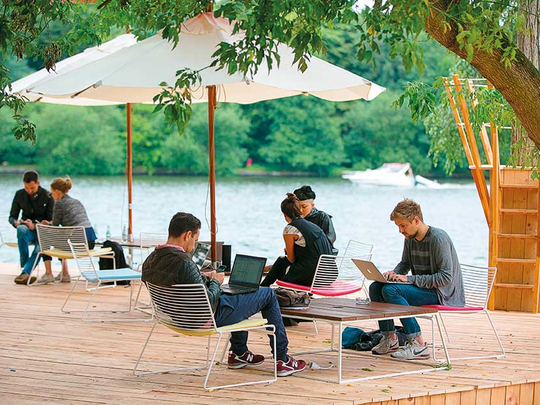
Frankfurt: Despite a lack of big consumer deals, and Berlin losing out to London as the European hub of venture capital, German investors have notched an up-tick in deals over the first quarter and are on the hunt for software start-ups.
Venture capital firms invested $467 million (Dh1.7 billion) across 87 equity deals in German-based start-ups in the first quarter, according to data from researcher CB Insights. That compares with $356 million across 91 deals in the first quarter of last year.
However, this is down from $556 million invested in the fourth quarter of 2016, and thanks to a death of big consumer deals, Berlin — Europe’s top destination for VC funds in 2015 — fell to fourth place behind London, Paris and Stockholm last year, according to new data from EY.
“The ecosystem continues to broaden in terms of themes — away from consumer, into software and other things,” said Pawel Chudzinski, co-founder and managing partner at Point Nine Captial.
The stronger start to the year will be welcome news for entrepreneurs after a tough 2016. VCs invested just $1.9 billion in 345 deals in German companies last year, compared with $3.6 billion across 407 deals in 2015, according to KPMG.
Consumer chill
Last year failed to see a return of the supersized funding rounds in companies backed by Berlin’s start-up factory Rocket internet SE, such as a $563 million stake in food-on-wheels service Delivery Hero in February 2015.
Now Rocket’s controlling Samwer brothers, and the VCs who’ve backed consumer internet plays, are waiting for a payoff.
“You definitely have a cooling-off in business-to-consumer e-commerce, that’s very clear,” said Thies Sander, a partner at Project A Ventures in Berlin, which raised 180 million euros ($191 million) in February across two funds. “The appetite for IT and software has definitely risen.”
Instead, VCs are looking for start-ups that can wed Germany’s software programming expertise with the country’s strengths in engineering and high-quality manufacturing.
“The big gains will be where industry-specific operational technology will be re-imagined with IT,” said Greg Papadopoulos, a venture partner at New Enterprise Associates, which last year invested in Konux, a Munich-based maker of sensors for improving railway and industrial operations whose customers include Germany’s national Deutsche Bahn railroad.
Project A Ventures made investments in companies including Spryker Systems, which makes website development software for retailers, and KRY, which conducts video consultations with doctors, while Point Nine Capital has backed start-ups including Mambu, a maker of banking software, and Contentful, a maker of tools for programmers.
Outside interest
UK-based investors are becoming increasingly interested in investing in German technology. 83 North, a venture capital firm with offices in London and Tel Aviv, is targeting European investments as the expense of the UK, due to the country’s decision to leave the European Union.
Luciana Lixandru, a partner at Accel in London, has been scouting deals in Germany and last year co-invested in Munich-based Celonis, whose tools can help replace consultants by streamlining purchasing and logistics. The city’s proximity to big companies including BMW, Siemens AG and Allianz SE, and the ability for German companies to get large enough to serve global markets makes the country attractive, she says.
US investors are also inking deals. Raisin, a Berlin fintech that seeks the best interest rates for European savers, raised $32 million from investors including Thrive Capital, founded by Joshua Kushner, the brother of President Trump’s son-in-law and adviser.
“Infrastructure and manufacturing is cool in Germany,” said Papadopoulos, formerly chief technology officer at Sun Microsystems.












